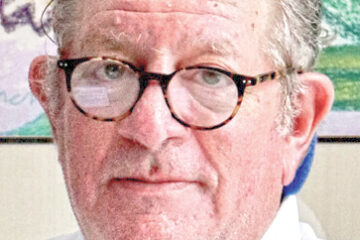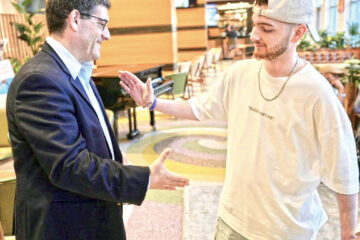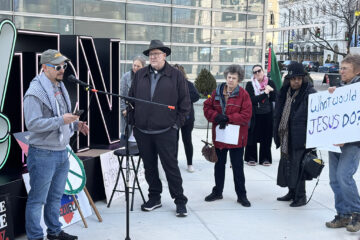1948: Dayton’s Role in the Year of Destiny
By Marshall Weiss and Bob Thum, The Dayton Jewish Observer
“June 8 marked the most dramatic opening meeting of a campaign in the history of this community,” trumpeted the lead story of the Dayton Jewish Community Council’s JCC News of June 25, 1948.
 On June 8, Golda Meir, the only woman in Israel’s provisional government, came to Dayton to receive a check for $300,000 on behalf of the weeks-old Jewish state, which was fighting for its life against five Arab armies.
On June 8, Golda Meir, the only woman in Israel’s provisional government, came to Dayton to receive a check for $300,000 on behalf of the weeks-old Jewish state, which was fighting for its life against five Arab armies.
The future prime minister of Israel received the check at the opening dinner of Dayton’s 1948 United Jewish Appeal, held at the Biltmore hotel.
The leaders of Dayton’s Jewish Community Council — now the Jewish Federation — borrowed funds for the $300,000 from the Winter and Third National Banks, based on Dayton’s 1948 pledges to the United Jewish Appeal.
Meir, then known as Golda Myerson, was on a whirlwind tour of U.S. Jewish communities to raise at least $100 million in cash for Israel by Aug. 1.
Dayton’s campaign was part of the national United Jewish Appeal’s 1948 campaign to raise a total of $250 million, billed as The Year of Destiny.
This campaign would help with immediate needs in the development of the Jewish state and provide relief and aid absorption for the displaced Jews of Europe.
“This year is a turning point in Jewish history,” said Dayton’s 1948 Campaign General Chairman A.B. Saeks in the May 19, 1948 JCC News. “This community, like others throughout the country, has in its hand the future of the Jewish people. We cannot fail — I am sure we will not fail.”
Dayton campaign leaders had attended an emergency national conference of UJA in New York on May 23, where they heard Meir’s pleas on behalf of the fledgling state and pleas on behalf of Europe’s displaced Jews.
Even earlier, on Feb. 24, in anticipation of the Jewish state’s needs, Dayton’s campaign had already taken out a bank loan and sent $100,000 to New York at UJA’s request.
At the dais in Dayton on June 8, Meir related the bravery of the Jews fighting in Israel.
“Ein brerah,” no alternative, she told the gathering.
Photojournalist Ruth Gruber, who had covered the Jewish refugee experience during and after the war, also spoke at the dinner.
“As the bell tolls in Israel,” Gruber said, “it will toll in Dayton too.”
Also on the program was Gen. Joseph T. McNarney, commanding general of Headquarters Air Material Command, Wright Field.
Known for his humanitarian assistance to DPs, he had succeeded Gen. Dwight Eisenhower as chief of U.S. forces in Europe and had served as commander-in-chief of the U.S. forces in occupied Germany.
As head of the American forces of occupation, McNarney was instrumental in saving thousands of Jewish lives.
Milton Marks, now 90, was involved with the 1948 campaign. He recalled how well it was organized under the leadership of the Dayton Jewish Community Council’s new director, Robert Fitterman.
“He brought vision to the community,” Marks said of the 35-year-old who came to Dayton in April 1948 and stayed on for 30 years.
“In those early years,” Marks said, “Sixty percent of our UJA campaign money went to Israel and some people were not particularly happy with that. There were some who would even be considered anti-Zionists.”
Marks, a past president of the Jewish Federation, didn’t consider himself an ardent Zionist at the time, but was an officer of the local B’nai B’rith and was influenced by his first wife, the late Miriam Siegel Marks, who embraced Zionism.
“For those who had an anti-Zionist sentiment,” he said, “Temple Israel’s Rabbi Russlander — who disagreed with that position — nevertheless acknowledged their viewpoint. Rabbi Russlander would remind us that those who were opposed to a Jewish state had a right to their opinions: we are all Jews.”
Marks said that the overwhelming majority of Dayton’s Jews were supporters of Israel.
The evidence was the success of the 1948 campaign, which raised a record $641,627 from an unprecedented 2,444 donors.
 Though Dayton’s 1948 campaign fell short of its $800,000 goal, the $641,627 remained Dayton’s highest campaign total until 1967 and the Six-Day War.
Though Dayton’s 1948 campaign fell short of its $800,000 goal, the $641,627 remained Dayton’s highest campaign total until 1967 and the Six-Day War.
Marks, who owned and operated Marks Travel, visited Israel in 1949. He became instrumental in arranging many tours to the Jewish state.
“With each trip I took,” he said, “I became more and more impressed with how Israel grew, and more connected to my Judaism.”





